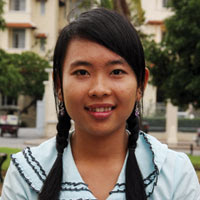via Khmer NZ
Thursday, 15 July 2010 15:03 Kim Yuthana and Cameron Wells
OBSERVERS yesterday criticised Education Minister Im Sethy’s move to ban two study books he said featured unsuitable “political” content, describing it as evidence of the government’s unwillingness to permit discussion of sensitive topics.
Meanwhile, several vendors in Phnom Penh said police and officials had recently pulled the books from their shelves or purchased all the copies in stock, and that they had also warned against selling the volumes.
In a letter to Information Minister Khieu Kanharith dated July 5, Im Sethy requested that the two general knowledge textbooks, produced by Cambodian author Pen Puthsphea for exam preparation, be banned because of apparent criticisms of Prime Minister Hun Sen and the ruling Cambodian People’s Party.
He said the ministry had discovered “unsuitable” passages on pages 146 and 147 of one book and on pages 100 and 101 of the second.
According to photocopies of the offending paragraphs enclosed with the letter, the first textbook asks questions such as, “In the near future, will Cambodia be able to develop? Why?”, and “What do you think of the practice of human rights and freedom in Cambodian society?”
The book’s answer to the first question is: “The government which is currently led by Prime Minister Hun Sen will not be able to lead Cambodia towards progress in the near future because corruption occurs from the top level of the government down to the local level, and law enforcement and the practice of human rights are still below zero.”
Pen Puthsphea said Tuesday that he had intended to highlight “both pro and con ideas” rather than criticise the government.
Ly Neang, owner of a newsstand near the National Institute of Education, said local authorities last week purchased all the copies of the books in her stock, and warned her against selling any more volumes written by Pen Puthsphea. “The authorities told me that they will confiscate the books if I continue to sell them,” she said.
Im Sethy could not be reached for comment yesterday.
But Sam Rainsy Party spokesman Yim Sovann said yesterday that the banning of the books highlighted an authoritarian streak within the government.
“It is only two books, but it shows the government wants to limit the freedom of the Cambodian people to build democracy,” he said.
“It’s a totally communist country, a totally authoritarian country. Opinion is not tolerated in this society.”
Ouch Leng, a land programme officer for the rights group Adhoc, said students stood to learn a lot from such books.
“I think it is better that governments of all countries recognise their good and bad points that are collected and compiled by authors,” he said.
Moeun Chhean Nariddh, director of the Cambodian Institute for Media Studies, said the passages that make reference to corruption could prevent students from repeating “the same mistakes” in the future.
“The passages referring to corruption are a very important tool to learn, so that students can also contribute to fighting corruption,” he said.
“There are corruption cases involving teachers trying to demand money from students. The students need to learn about corruption. If teachers demand money from the students, how will the students know that this is corruption?”
But Hang Chhaya, executive director of the Khmer Institute for Democracy, questioned whether opinions about the government’s merits and deficiencies should be included in school materials.
“I’m not sure why [corruption] needs to be taught in this way,” he said.
“Students are much better learning about the history, and learning about corruption from that. If I was a student at that age, if someone has an opinion, it can take away from teacher’s teaching.”
Your say: Is the textbook ban right or wrong?
Sovann Khema, 20 National University of Management “The Information Ministry seizing the book makes me lack general knowledge that relates to Cambodian social issues. They have forbidden the students from knowing this vital information.” | Sal Som, 25 Royal University of Law and Economics “People have the right to gain knowledge through books or media. The authors have the right to criticise all points about the reality of society, and literature is a mirror of society. If the state has done this, then it seems they have banned the right to know.” | Chheoun Lav, 22 Build Bright University “In a democratic country, the right to get information is very important to every single person, because this information helps people understand what our society is.” |




No comments:
Post a Comment